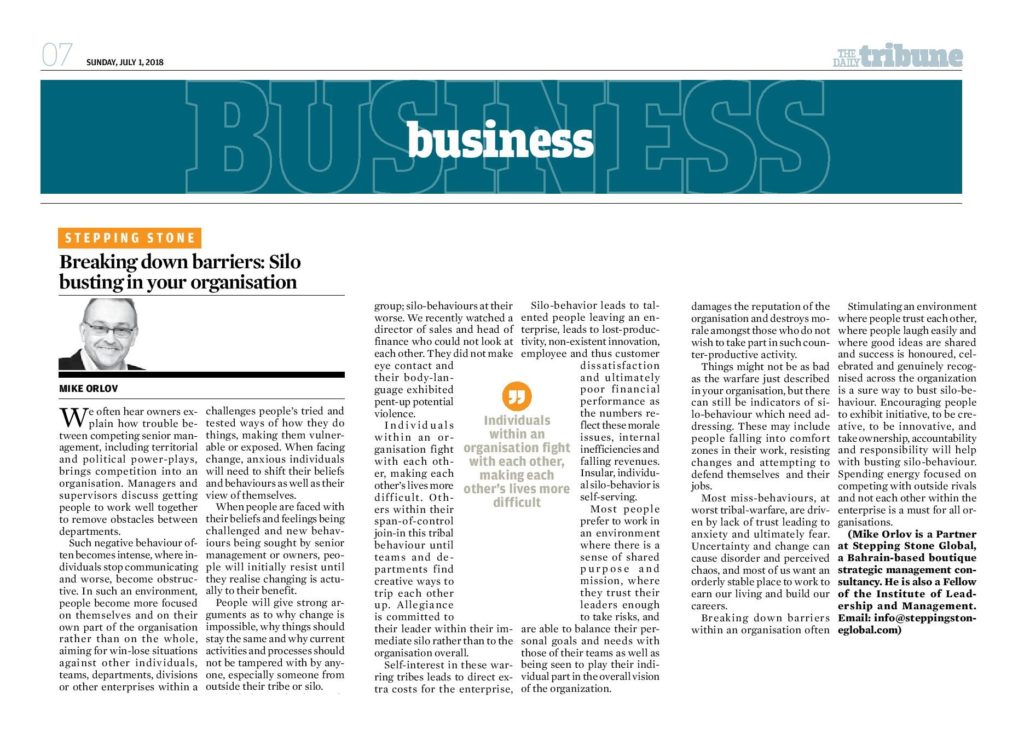
We often hear owners explain how trouble between competing senior management, including territorial and political power-plays, brings competition into an organisation. Managers and supervisors discuss getting people to work well together to remove obstacles between departments. Such negative behaviour often becomes intense, where individuals stop communicating and worse, become obstructive. In such an environment, people become more focused on themselves and on their own part of the organisation rather than on the whole, aiming for win-lose situations against other individuals, teams, departments, divisions or other enterprises within a group; silo-behaviours at their worse. We recently watched a director of sales and head of finance who could not look at each other. They did not make eye contact and their body-language exhibited pent-up potential violence. I n d i v i d u a l s within an organisation fight with each other, making each other’s lives more difficult. Others within their span of-control join-in this tribal behaviour until teams and departments find creative ways to trip each other up. Allegiance is committed to their leader within their immediate silo rather than to the organisation overall. Self-interest in these warring tribes leads to direct extra costs for the enterprise,
damages the reputation of the organisation and destroys morale amongst those who do not wish to take part in such counter- productive activity. Things might not be as bad as the warfare just described in your organisation, but there can still be indicators of silo- behaviour which need addressing. These may include people falling into comfort zones in their work, resisting changes and attempting to defend themselves and their
jobs. Most miss-behaviours, at worst tribal-warfare, are driven by lack of trust leading to anxiety and ultimately fear. Uncertainty and change can cause disorder and perceived chaos, and most of us want an orderly stable place to work to earn our living and build our careers. Breaking down barriers within an organisation often challenges people’s tried and tested ways of how they do things, making them vulnerable or exposed. When facing change, anxious individuals will need to shift their beliefs and behaviours as well as their view of themselves. When people are faced with their beliefs and feelings being challenged and new behaviours being sought by senior management or owners, people will initially resist until they realise changing is actually to their benefit. People will give strong arguments as to why change is impossible, why things should stay the same and why current activities and processes should not be tampered with by anyone, especially someone from outside their tribe or silo. Silo-behavior leads to talented people leaving an enterprise, leads to lost-productivity, non-existent innovation, employee and thus customer dissatisfaction and ultimately poor financial performance as the numbers reflect these morale issues, internal inefficiencies and falling revenues. Insular, individual silo-behavior is self-serving. Most people prefer to work in an environment where there is a sense of shared p u r p o s e and mission, where they trust their leaders enough to take risks, and are able to balance their personal goals and needs with those of their teams as well as being seen to play their individual part in the overall vision of the organization. Stimulating an environment where people trust each other, where people laugh easily and where good ideas are shared and success is honoured, celebrated and genuinely recognised across the organization is a sure way to bust silo-behaviour. Encouraging people to exhibit initiative, to be creative, to be innovative, and take ownership, accountability and responsibility will help with busting silo-behaviour. Spending energy focused on competing with outside rivals and not each other within the enterprise is a must for all organisations.
